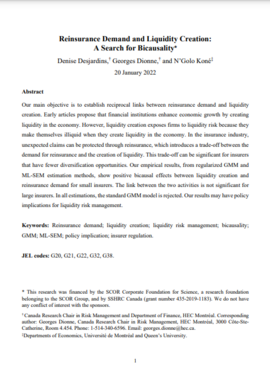- FR
- EN
Reinsurance demand and liquidity creation: A Search for Bicausality
A research report published by the SCOR Foundation for Science

Insurers play an important role in aggregate investment activities. By investing policyholder premiums, insurers deploy capital on lower-volatility investments that provide more resilience during crises than do those of other investors. But this source of stability can be fragile because insurers face significant aggregate insurable risks such as climate risk, digital disruptions, cyberattacks, and pandemics. Because liquidity creation is a risky activity, it may affect the demand for reinsurance.
Conversely, more reinsurance opens accessibility to liquidity creation. The main contribution to the literature of this research is to document the reciprocal roles of liquidity creation and reinsurance demand and to investigate the dual relationship between insurers’ liquidity creation and reinsurance demand, in US property-liability insurance companies. Do investing insurers buy more reinsurance, and conversely, do insurers buying reinsurance invest more in illiquid assets or create more liquidity in the economy?
The research shows there are reciprocal causal links between reinsurance demand and liquidity creation for small insurers. The links between the two activities are not significant for large insurers and are mixed for medium insurers. Economic recessions affect the relationship between liquidity creation and reinsurance demand and the nature of the recession matters, which is an important conclusion for policy implications.
The research was conducted by the Canada Research Chair in Risk Management at HEC Montréal and the Department of Economics at the University of Montréal led by Georges Dionne, full Professor, Department of Finance, HEC Montréal.
About the SCOR Foundation for Science
The SCOR Corporate Foundation for Science, created in 2011, forms part of the Group’s long-term commitment to research and disseminating knowledge about risk. It promotes and finances research by means of subsidies, awards and conferences. The Scientific Council of the SCOR Corporate Foundation for Science, consisting of renowned scientists from a variety of disciplines, is in charge of determining its orientation in the areas of intervention that may be selected, with regard to the main projects on which it has to decide and its long-term strategy.
